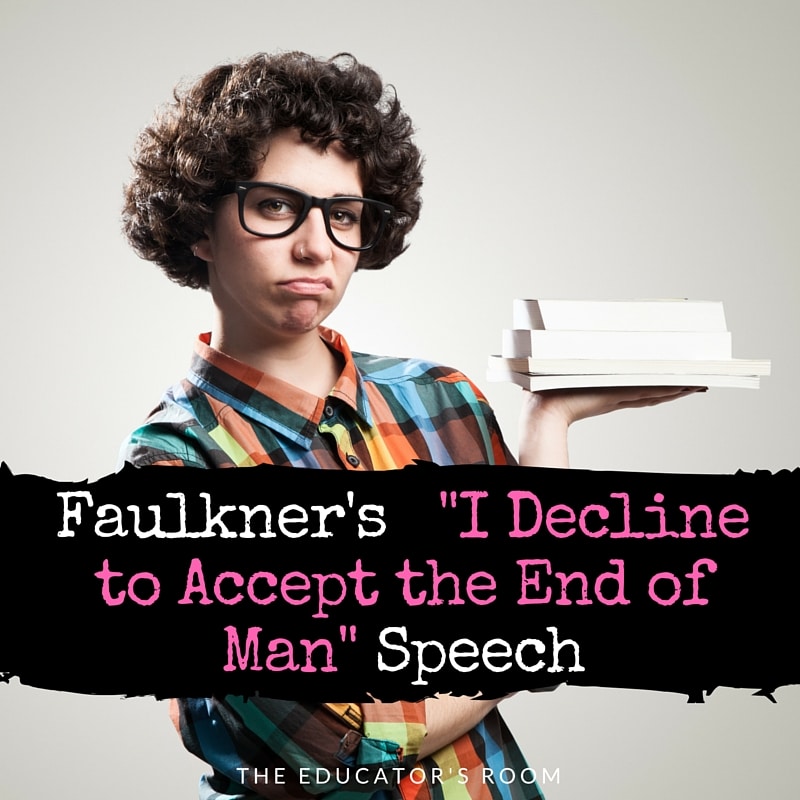American authors are studied in the secondary ELA classroom for their writing style and contributions to literature. 20th Century writer William Faulkner (1897 –1962) is one such author whose short stories (A Rose for Emily, The Bear, Barn Burning) are often anthologized in textbooks. His novels ( As I Lay Dying, Light in August, Absalom, Absalom!)are also featured in classrooms as well.
Known for the stories he set in his fictional Yoknapatawpha County, Faulkner was awarded the 1950 Nobel Prize for Literature. This prize gave him the opportunity to write in another genre, the acceptance speech, and his acceptance speech is an excellent informational text to bring into the English Language Arts classroom.
Moreover, this acceptance speech has been rated #33 out of the Top 100 American Speeches on the American Rhetoric website.
The Cold War was escalating when William Faulkner accepted the Nobel Prize and that historical context is critical to understanding why, with less than a minute into the speech, he posed the paralyzing question, “When will I be blown up?”
In confronting the terrifying possibility of nuclear war, Faulkner then answered his own rhetorical question in a powerful optimistic statement:
“I decline to accept the end of man.”
Reading this speech provides students an opportunity to analyze how Faulkner’s purpose or message is fitted to meet the standards of the speech genre. Giving students a speech like this to analyze allows students a chance to compare and contrast an author’s writing style between fiction and non-fiction writing. Additionally, giving students speeches to read or listen to also helps teachers increase their students’ background knowledge on an author as important as Faulkner.
Faulkner’s acceptance speech is a short 557 words and there is a recording (audio) of 2:56 minutes on the Nobel Prize Website. Running the text of the speech through a Readability score calculator shows that the Flesch-Kincaid Reading Ease is 66.5 with a grade reading level of 9.8.
If teachers are looking to incorporate the study of rhetoric, Faulkner’s speech offers a number of examples including the Polysyndeton . This literary device is when conjunctions are repeated between words or phrases or sentences in order to elicit a feeling of energy and multiplicity that crescendos. Faulkner uses this rhetorical device in explaining why he refuses to accept the end of man:
“…by reminding him of the courage and honor and hope and pride and compassion and pity and sacrifice which have been the glory of his past.”
Finally, using a speech in the secondary classroom also meets the Common Core Literacy Standards for English Language Arts that require students to determine word meanings, appreciate the nuances of words, and steadily expand their range of words and phrases.
Faulkner’s expression of man’s enduring power was delivered in Stockholm, Sweden, at the Nobel Prize ceremony begun in 1901 by Alfred Nobel. The irony in Faulkner’s speech could not be lost on the audience as Nobel was the inventor of dynamite as well as a Swedish chemist, engineer, innovator, and armaments manufacturer. Consider that Faulkner’s announcement of man’s enduring power was delivered at ground zero for the arms race.
In the case of William Faulkner’s Nobel Prize Acceptance Speech, studying speeches can also increase our students’ understanding of history as well.







